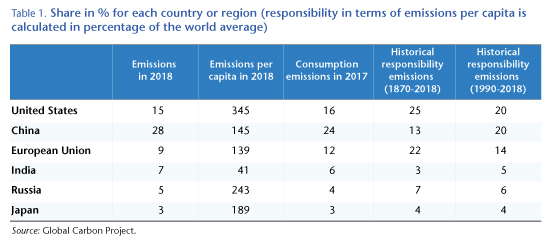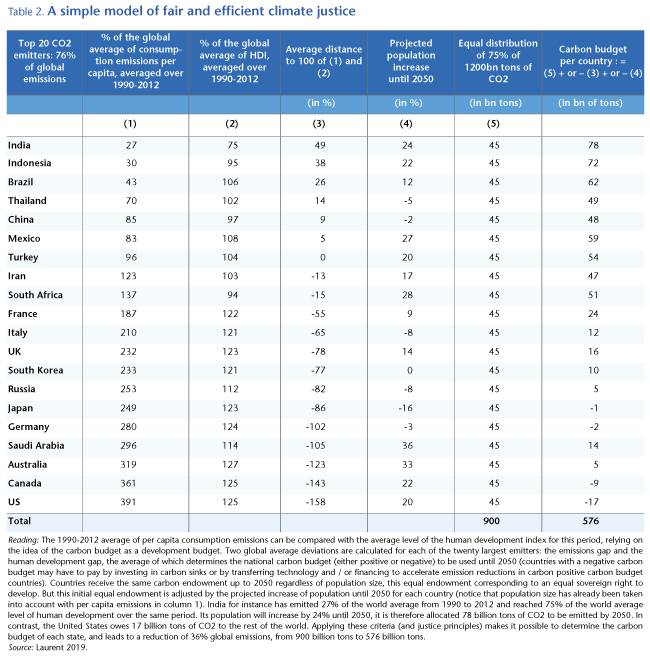Par Eloi Laurent
On September 18th 2019, 16 years old climate activist Greta Thunberg appeared before the United States House of Representatives. When asked to submit a formal version of her inaugural statement, she replied that she would be giving lawmakers a copy of the IPPC special report on the impacts of global warming of 1.5 °C, the so-called “SR 1.5“. “I am submitting this report as my testimony because I don’t want you to listen to me, I want you to listen to the scientists”, she said eloquently.
By the same token, when asked what words she wanted to be printed on the sails of the boat carrying her across the Atlantic Ocean from Sweden to the US, she asked for a blunt message urging citizens and policymakers to act upon climate knowledge: “Unite behind Science”. Greta Thunberg deserves considerable praise for her intelligence, courage and determination in the face of ignorance, skepticism and animosity. But she is wrong on one important point: nations and people around the world won’t unite behind science. They will only unite behind justice.
Any meaningful conversation among humans about reform, change and progress starts with debating justice principles at play and imagining institutions able to embody these principles. This is especially true of the titanic shift in attitudes and behaviors required by the climate transition, which goal is nothing short of saving the hospitality of the planet for humans.
Climate injustice is obvious in our world. On the one hand, a handful of countries, about ten percent (and a handful of people and industries within these countries) are responsible for 80% of human greenhouse gas emissions, causing climate change that is increasingly destroying the well-being of a considerable part of humanity around the world, but mostly in poor and developing nations. On the other hand, the vast majority of the people most affected by climate change (in Africa and Asia), numbering in the billions, live in countries that represent almost nothing in terms of responsibility but are highly vulnerable to the disastrous consequences of climate change (heat waves, hurricanes, flooding) triggered by the lifestyle of others, thousands of miles away.
Why is climate change still not mitigated and actually worsening before our eyes, while we have all the science, technology, economics, and policy tools we need to fix it? Largely because the most responsible are not the most vulnerable, and vice-versa.
And yet, the time may be ripe for climate justice to take center stage in international negotiations. Data compiled by the Global Carbon Project released last week show that top emitters are converging in terms of climate responsibility (table 1).

Of course, China remains by far the first polluter: the country has emitted in 2018 roughly twice the volume of CO2 than the US, thrice the amount of the EU, four times the amount of India, five times the amount of Russia. Consider the amount per capita, and the picture changes dramatically: a citizen of the United States emits more than twice CO2 than a Chinese. And yet, for the first time, a European is (slightly) less responsible than a Chinese in terms of per capita emissions. Conversely, it is well established that historical responsibility for greenhouse gas emissions falls largely on the shoulders of Western countries, with the US and the EU jointly responsible for half of emissions since the industrial revolution, while China only accounts for less than 15%. And yet, for the first time, China is as responsible as the US when emissions are counted since 1990 onwards (both countries accounting for 20% each of emissions over the 1990-2018 period).
It is thus the right time to devise actionable equity criteria, commonly agreed upon top emitters, as to how distributing the remaining “carbon budget” (the overall amount of emissions remaining before the Earth’s climate reaches a catastrophic tipping point, approximately 1200 billion tons of carbon that remain to be emitted over the next three decades so as to limit the rise of ground temperatures to around 2 degrees by the end of the 21st century).
But as incredible as it may seem, the formal global conversation has not yet started on climate justice: as the COP 25 ends in Madrid and all eyes turn to COP 26 for a renewed climate ambition, countries are still negotiating at the UN on volumes of emissions that do not take into account current and projected population, human development level, geographic basis (production vs. consumption emissions), historical responsibility, etc. By the same token, The Paris Agreement (2015) mentions the term “justice” only a single time, to affirm that signatories recognize “the importance for some of the concept of ‘climate justice’”. This is clearly a misinterpretation. The whole point of climate justice is precisely that it is not confined to a few nations or important for a few people: it should be the concern of all involved in climate negotiations.
It can be shown that the application of a hybrid but relatively simple model of climate justice based on five criteria would lead to substantially cutting global emissions in addition to the carbon budget (by 36%) over the next three decades which would ensure meeting the goal of 2 degrees, and even targeting 1.5 degrees, thereby enhancing the fairness of this common rule with respect to the most vulnerable countries and social groups (see table 2).

As available data make clear, we are collectively missing the wrong targets on climate. Even if all countries fulfilled their pledges and reach their targets, the increase in temperatures would still be of 3 degrees by the end of the 21st century (or twice the target agreed upon at the Paris Agreement in 2015). In other words, what is lacking is not just the political will but also the imagination. Climate justice is the way out of this impasse. Climate justice is the key to understanding and eventually solving the urgent climate crisis. Climate justice is the solution to climate change.
Poster un Commentaire